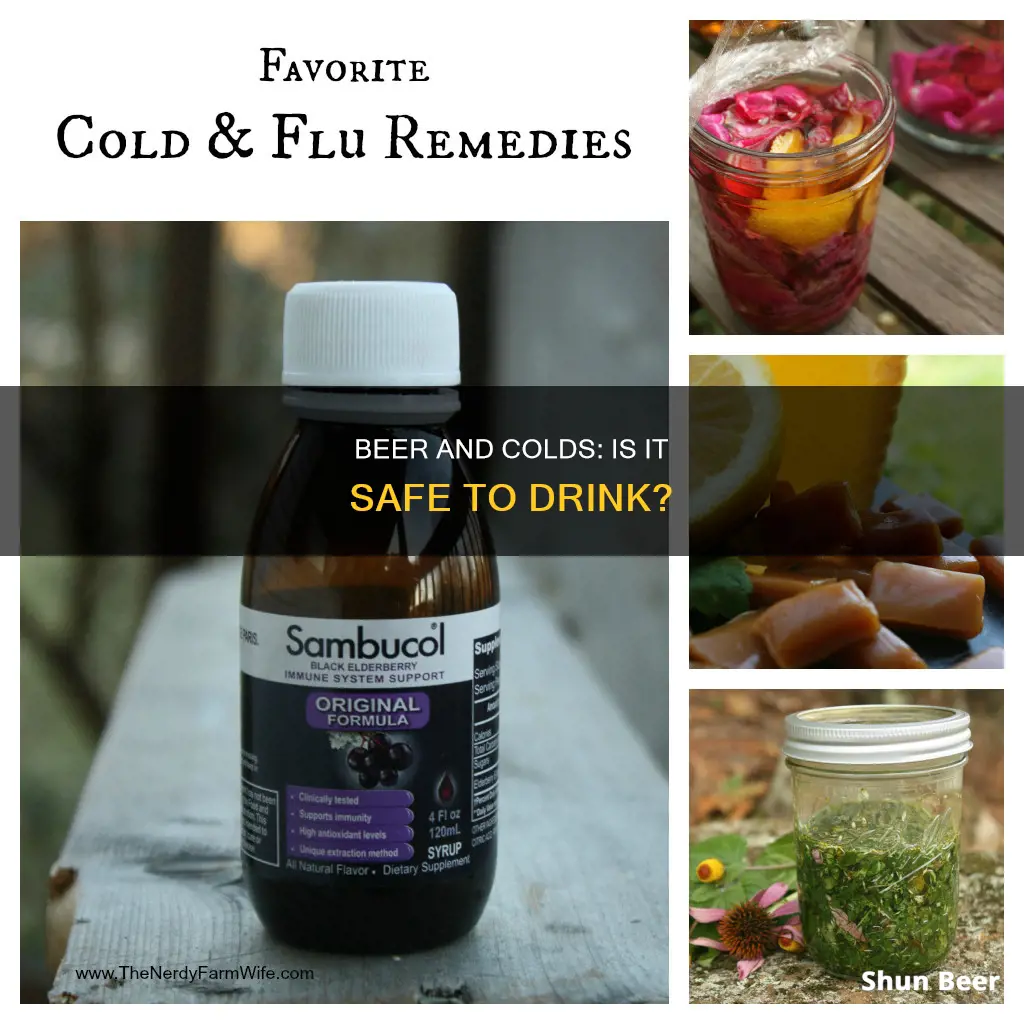
There are many old wives' tales about how to treat a cold, and drinking alcohol is often suggested as a remedy. But is there any truth to this? Well, it's complicated. While there is some evidence that drinking a small amount of alcohol may reduce the number of colds you get per year, health authorities generally do not recommend drinking alcohol during a cold. In fact, the Centers for Disease Control and Prevention (CDC) advises people who do not currently drink to avoid starting for any reason. One reason for this is that drinking alcohol while you're taking medications for cold, cough, and allergy symptoms can be dangerous. For example, mixing alcohol with acetaminophen, which is often found in cold medications, can cause liver damage. Alcohol can also be dehydrating, which could make you feel worse.
What You'll Learn

Alcohol is not a cure for the common cold
There is no cure for the common cold, and alcohol is not one either. While some studies suggest that moderate alcohol consumption may decrease the number of colds people get per year, there is little evidence to support this. Rhinoviruses, which are the most common cause of colds, have no cure. Most colds are mild and short-term, and symptoms usually improve within 10 to 14 days without the need for medical treatment.
Health authorities generally advise against drinking alcohol during a cold. Alcohol has different effects on the immune system depending on the amount consumed. While moderate consumption may enhance immune function, long-term alcohol use can increase a person's susceptibility to infections, including colds. It can also cause inflammation throughout the body, alter gut flora, damage the intestinal lining, and impair the function of immune cells in the respiratory tract. All these changes make a person more vulnerable to infections.
In addition, alcohol can lead to nasal congestion, which may worsen the symptoms of a cold. A 2022 study found that alcohol consumption decreased nasal volume and increased airway resistance in adults, suggesting that it increases congestion. While a chemical compound in hops called humulone is believed to help fight the common cold virus, a single can of beer does not contain enough humulone to have any effect.
Instead of alcohol, it is recommended to opt for over-the-counter medications or home remedies to relieve cold symptoms. Decongestants, cough medication, and pain medications can help reduce symptoms and improve comfort. Getting plenty of rest, staying hydrated, using saline nasal spray, and inhaling steam are also effective ways to manage a cold.
Bariatric Patients and Beer: What's Safe to Drink?
You may want to see also

Excessive alcohol consumption increases the risk of infection
Excessive alcohol consumption has been linked to a higher risk of infection and disease. It is important to note that excessive drinking includes binge drinking and heavy drinking. Binge drinking is defined as four or more drinks for women, or five or more drinks for men in a single sitting. Heavy drinking is characterised as consuming eight or more drinks per week for women, and 15 or more drinks per week for men.
Excessive alcohol consumption can have detrimental effects on the immune system, making the body more susceptible to infections. Research has shown that long-term alcohol use can increase a person's susceptibility to viral and bacterial infections, including colds, by up to 3-7 times. This is because alcohol can:
- Alter gut flora
- Damage the intestinal lining
- Impair the function of immune cells in the respiratory tract
Additionally, alcohol can cause inflammation throughout the body, which is harmful to overall health. It also affects the liver, the organ responsible for processing alcohol in the body. When excessive amounts of alcohol are consumed, the liver is unable to keep up, leading to a range of problems, including liver inflammation and alcoholic pancreatitis.
Furthermore, excessive alcohol consumption is associated with an increased risk of developing more severe illnesses, such as pneumonia and tuberculosis. Even a single occasion of excessive drinking can slow down the body's ability to fight off infections for up to 24 hours afterward.
While there is limited evidence suggesting that moderate alcohol consumption may reduce the frequency of colds, it is important to note that excessive drinking is detrimental to overall health and increases the risk of infection. Therefore, it is generally recommended to avoid starting to drink alcohol, especially during a cold, as it can further compromise the immune system.
A Beer Lover's Guide to Mohegan Sun Fest
You may want to see also

Alcohol may reduce the frequency of colds
While there is no cure for the common cold, there is some evidence that drinking a small amount of alcohol may reduce the number of colds people get per year. However, excessive alcohol consumption is highly damaging to human health and increases the risk of infection.
According to a 2015 review, this may be because moderate alcohol consumption enhances immune function. More recent and large-scale studies are needed to verify this. Other studies suggest that moderate alcohol consumption may decrease the number of colds people get overall because alcohol influences aspects of the immune response. Multiple mechanisms may be responsible for this effect, including the release of inflammatory cytokines, which may be beneficial for fighting infections in the short term.
A 2012 study compared the rate of colds among 899 males in Japan. Of the participants, 83.4% reported drinking alcohol, and 55.4% reported having at least one cold in the last year. On average, the participants who did not drink at all were more likely to experience two more episodes of the common cold during the study than those who drank 11.5 to 35.8 grams (g), or 0.49 to 1.53 fluid ounces (fl oz), of alcohol per day.
It is important to note that health authorities generally do not recommend drinking alcohol during a cold. The Centers for Disease Control and Prevention (CDC) also advises people who do not currently drink to avoid starting for any reason. Additionally, drinking alcohol while taking medications for cold, cough, and allergy symptoms can be dangerous, especially if the medications include acetaminophen, which can cause liver damage when mixed with alcohol. Alcohol can also be dehydrating, which may worsen how you feel when sick with a virus.
Beer and Coffee: A Safe Mix?
You may want to see also

Alcohol may cause congestion
Drinking alcohol can lead to nasal congestion, and this reaction can occur for several reasons. Firstly, some individuals have lower levels of enzymes that metabolise alcohol (ethanol) into compounds that the body can process and excrete. When these enzymes don't break down alcohol byproducts quickly enough, they can accumulate to levels that trigger a mild allergic reaction, leading to congestion.
Secondly, alcoholic beverages like wine, beer, and spirits naturally contain histamine, a compound known to elicit allergic responses. Red wines, in particular, tend to have the highest histamine content. Additionally, alcohol can stimulate the body to release excess histamines, causing an inflammatory response in the airway, resulting in congestion and shortness of breath.
A 2022 study tested the effects of alcohol on nasal airflow in 31 adults, and found that alcohol consumption led to decreased nasal volume and increased airway resistance, indicating increased congestion. However, as this was a small study, further research is needed to confirm the results.
Alcohol intolerance is a metabolic disorder characterised by uncomfortable reactions to alcohol, with nasal congestion and skin flushing being the most common side effects. It occurs when the body lacks the proper enzymes to efficiently break down alcohol and its toxins. This intolerance is caused by a genetic variation in the ALDH2 gene, which affects the effectiveness of the corresponding ALDH2 enzyme.
While alcohol intolerance is not a true allergy, some people experience true allergic reactions to ingredients in alcoholic beverages, such as fermented grains, preservatives, or other chemicals. These allergic reactions can cause more severe symptoms, including anaphylaxis, which requires emergency medical care.
Beer and Augmentin: Safe Mix?
You may want to see also

Alcohol may be dangerous when mixed with medication
Drinking alcohol while you're sick is generally not recommended, as it can prolong your recovery and worsen your symptoms. However, one limited study suggests that drinking 3-4 drinks per day may decrease symptomatic illness after infection with a cold virus. Another limited study suggests that moderate wine consumption may decrease the incidence of the common cold.
Mixing alcohol with medication can be harmful and, in some cases, dangerous. Alcohol can interact with and limit the function of medications, making them less effective or even harmful to your body. Alcohol may also increase the side effects of certain medications, such as drowsiness, dizziness, impaired motor control, abnormal behavior, and memory loss.
- Acetaminophen: Acetaminophen is a common pain reliever and fever reducer found in many over-the-counter cold and flu medications. Since both acetaminophen and alcohol are metabolized in the liver, drinking while taking this medication can cause liver damage.
- Chlorpheniramine Maleate: Alcohol can worsen the side effects of this antihistamine, such as drowsiness or nausea.
- Pseudoephedrine and Phenylephrine: These nasal decongestants can help clear sinuses but can negatively interact with alcohol, causing difficulty sleeping and headaches.
It is important to note that these are just a few examples, and there are many other medications that can interact harmfully with alcohol. Always read the label on your medication and consult your pharmacist or healthcare provider if you have any questions about potential interactions with alcohol.
Beer: A Surprising Remedy for Ethylene Glycol Poisoning?
You may want to see also
Frequently asked questions
While there is limited evidence that moderate alcohol consumption may reduce the frequency of colds, health authorities generally do not recommend drinking alcohol during a cold. Alcohol can also be dehydrating, which may worsen how you feel.
According to a study by Japanese beverage giant Sapporo, you would need to consume 30 12-oz cans of beer to get enough humulone, a chemical compound found in hops that can help fight the virus that causes the common cold.
Beer has been shown to increase bone density and reduce the risk of heart disease, Alzheimer's, and other types of dementia. Protein in hops can also make your hair and skin shinier.







